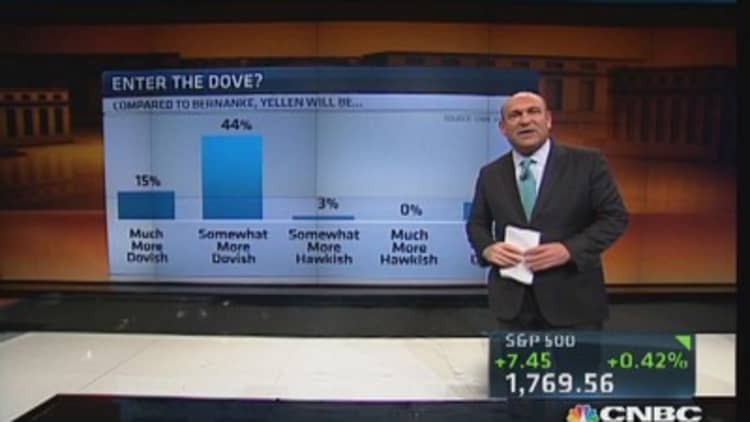
Enter Janet Yellen, the dove.
The CNBC October Fed Survey finds nearly 60 percent of respondents believe that Fed Chair nominee Janet Yellen will be more dovish than outgoing chairman Ben Bernanke, who himself was nicknamed "Helicopter Ben" for his leanings towards easy monetary policy.
With Yellen as chair, "Expect a weak response to rising inflation in the future,'' former Cleveland Fed President Lee Hoskins wrote in response to the survey.
(Read more: Ron Paul: Son will hold up Yellen to get Fed bill vote)
Fifteen percent of respondents believe the next fed chair will be "much more hawkish" than Bernanke; 44 percent said "somewhat more dovish" and 28 percent said about the same.
CNBC then asked respondents to compare Yellen and Bernanke in 10 specific categories. Yellen was seen as far more concerned about unemployment than Bernanke, receiving 4.6 out of a possible five in the category. She received a 2.89 on inflation concern out of five, compared to 3.35 for Bernanke.
"Could we have a bit of an inflation scare sometime in 2014?," wrote Jim Paulson of Wells Capital Management. "Yellen will come in as chairman perceived as a dove when the U.S. dollar is already very weak and falling, commodity prices bottomed in 2013 and may be showing signs of lifting again…''
Yellen also received lower grades than Bernanke on her ability to manage a financial crisis and for respect from international financial leaders. But her communications skills were viewed as better than Bernanke's and her monetary policy and regulatory expertise about on par.
And not everyone is convinced she's quite the dove Wall Street is making her out to be. "The criticism of Yellen as being soft on inflation is unfair," said John Donaldson, of Haverford Trust Co. "She is fully committed to the Fed's dual mission. There has been so little inflation during her tenure as vice-chair, what opportunity has there been for her to "talk tough" on inflation?''
(Read more: Hoping Yellen not a 'bad policy enabler': Corker)
Still, with Yellen likely to win Senate approval, Wall Street now doesn't believe the Fed will reduce its asset purchases until April 2014, compared with November 2013 in the prior survey.
The asset purchases, known as quantitative easing, are not seen ending until December 2014, and 40% percent believe they won't end until sometime in 2015.
—By CNBC's Steve Liesman. Follow him on Twitter: @steveliesman


